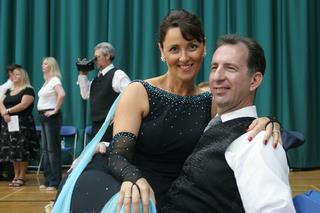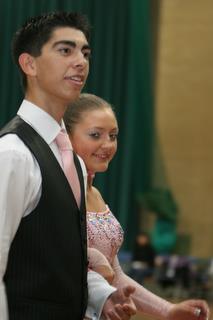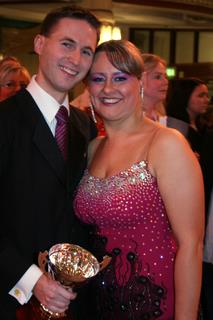Introduction
Editorial: Tell me I'm stating the obvious here but - you can't ballroom dance on your own! We're lucky at Wright Rhythm to have so many talented and enthusiastic dancers that everyone can find someone to dance with, from beginners to advanced competitors. However, this can mean that we just muddle along, taking our partner for granted when really this relationship will be the most important thing in shaping us as dancers. This anonymous article was recently send to wrightrhythm.co.uk and has some insightful observations and suggestions that may help you build a better partnership and so become a better dancer.
Published
Monday February 05 2007
, by Anonymous
The Role of the Dance Partner

The fascination with competitive dancing is the many facets that contribute to make it what it is. Initially you think it is purely about learning to dance. But it is much more than simply learning or creating specific movements, it's a partnership sport and as such the partners have to learn about certain qualities that will determine whether or not the dance partnership is successful.
A basic check list of what you may initially look for in a partner maybe, someone:
- with the ability to learn and dance;
- approximately your height;
- of a similar age to you;
- of comparable experience to you;
- who is capable of compromise;
- who lives near you or is willing to travel;
- who shares your dancing goals ("ambitious" vs. "social");
- who is prepared to make time to practice.
So what happens if you are fortunate enough to be in a dance partnership!!?? Often, new dancers enter into partnerships without giving it too much thought. Sometimes it works, sometimes it doesn't. But here you have two individual dancers, both trying to be the best they can, now having to work together in order to achieve their individual goals. Ironically, to be able to achieve their personal ambitions, the partnership must work. For the relationship to work, grow and improve it must be treated seriously. Only then will it be able to weather the problems all relationships encounter.
What would you say your role is as a dance partner? Would it be to either lead or to follow? This unfortunately would be too simplistic. What about the social skills required?
 Social Skills
Social Skills
Accepted, there is the fact that one partner will endeavor to lead and transmit his /her intentions, whilst the other will attempt to read and interpret these messages. But this requires teamwork! And whether you are aware of it or not, a lot of your lessons and practice time focuses on this teamwork. Both the leading and the interpreting are equally challenging and as such each member of the partnership must learn to support the other. The dance will only start coming to life, when the man's lead is clear and the woman's interpretation, of the lead, is accurate and when each partner is committed to the other. However, up to this point we have only briefly considered the partnership on the dance floor. But what about off the floor? In order for this trust to be firmly established other skills need to be developed. Skills such as a compassionate and cooperative attitude; patience, persistence, listening to your partner; a willingness to practice and to always see each other in a positive light are essential.
Goals
Any partnership will flounder, if you are both not conscious of what is required to make it work. Communication is paramount, talk to each other. Always be aware of your partners' goals, with regards to dancing. Ideally you should share similar goals. If one of you is ambitious and the other is not, this may lead to conflict. Discuss issues such as what you want from dancing, what you want in a partner, how committed you're going to be to dancing and practicing or which styles you'll stick with. Most importantly, remember that people change. These issues should be re-discussed, because the answers, you both give, may change over time.
Early in the relationship you may wish to discuss:
- Why are you dancing?
- What is the goal? Is it to win?
- Are competitions important?
- Do you ever plan to go Amateur? Or is it purely for fun and the social?
- What is your level of commitment?
- Time - How much time are you willing to spend each week on lessons and practicing, with your partner and by yourself?
- Physical/Psychological - What is your physical limit i.e. do you practice until you get tired or do you like to push yourself?
- How dedicated are you to the sport?
- Financial - How much are you willing to spend on: classes, private lessons, competitions etc?
- Other - What are your other commitments? School? Work? Family? Other hobbies?
- What in your life is more important than dancing?
- Practice - How often will you practice and where?
- How do you like to practice?
- Do you prefer to pick one dance per session; or go through all dances; or to work on particular figures?
Issues that may be important in an established partnership:
- How can we structure our practices to make them more efficient?
- What is your dancing philosophy?
- What style of dance do you prefer?
- How should you relate to each other in your dancing?
- What types of stories do you want to tell in your dancing?
- What are the technical goals i.e. how the dancing needs to improve within the next 6-12months?
Questions that may be considered in a mature relationship might be:
- Are you still dancing for the same reasons as when you started?
- What in your life will affect you dancing (e.g. graduation, marriage, children, and job change)?
- How will you each face that situation?
"You need to work each other out before you are able to get the best out of each other"
- Karen Hardy.
Arguments
 As with any relationship, there will be arguments. This could be due to any number of issues relating to your actual dancing. Be prepared to listen and seriously consider each others viewpoint. Develop an understanding attitude. Sometimes you may be required to sense what is sometimes left unsaid. It is not only about you, it is about the partnership. For the partnership to work, you both need to support and respect each other.
As with any relationship, there will be arguments. This could be due to any number of issues relating to your actual dancing. Be prepared to listen and seriously consider each others viewpoint. Develop an understanding attitude. Sometimes you may be required to sense what is sometimes left unsaid. It is not only about you, it is about the partnership. For the partnership to work, you both need to support and respect each other.
What would be your normal response in a lesson, practice session or even a competition, when something goes wrong? If the fault was your partners, do you remind them of their error as soon as you get a chance; or do you find a way to deal with it so that they do not feel embarrassed, frustrated or irritated. This requires skill, compassion and understanding. Sometimes you may need to "bite your tongue" and put aside your frustration in order to create a positive environment for you both to operate in. Easier said then done, but if you respect your partner and value your partnership you will want to do everything to make it a success.
Consider a competition like Blackpool, where each dancer is being judged individually and the pressure is intense, not just on the day, but for the months, weeks and days leading up to the event. This is when you can really help your partner. When practices and routines are not working out well, this is not the time to criticize. This is the time for you both to be patient and support each other. You need to build your partners confidence, remind them of how good they are and what they can achieve with focused practice. Always attempt to build your partners confidence, especially when it may be a bit shaky. When you watch a program such as Strictly Come Dancing, something that becomes very apparent is how the Professionals will not entertain negative thinking. They focus on the positive. They remind their partner of how good they were and what they have achieved. These are lessons you need to take on-board. A dance partnership is a dynamic process requiring thought, effort and balance. One party should never dominate the other.
If the listening, support or building of confidence is only coming from one side of the partnership; in other words one is always doing the giving and the other is only taking, the partnership will be short lived. As a partner you need to be patient, tolerant, honest, persistent and positive. At no point should you allow selfishness, irritability or negativity to erode the relationship. It is both partners responsibility to create a positive and supportive climate to work in. You need to build each other up continually.
This however is only a personal viewpoint and may not apply to everyone.